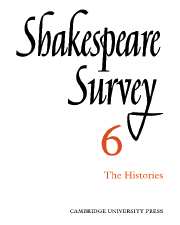Book contents
- Frontmatter
- Shakespeare's History plays: 1900-1951
- The Unity of 2 Henry IV
- Anticipation and Foreboding in Shakespeare’s Early Histories
- Middle-Class Attitudes in Shakespeare’s Histories
- A Reconsideration of Edward III
- On Producing Henry VI
- The Huntington Library
- An Early Elizabethan Playhouse
- Shakespeare Learns the Value of Money: The Dramatist at Work on Timon of Athens
- Shakespeare’s French Fruits
- An Elizabethan Eyewitness of Antony and Cleopatra?
- Othello’s “It is the cause . . .”: An Analysis
- On Translating Hamlet
- Shakespeare in China
- International Notes
- Shakespeare Productions in the United Kingdom: 1951
- Shakespeare’s History Plays - Epic or Drama?
- Festival Shakespeare in the West End
- The Year's Contributions to Shakespearian Study 1 Critical Studies
- 2 Shakespeare’s Life, Times and Stage
- 3 Textual Studies
- Books Received
- Index
- Plate Section
Shakespeare’s History Plays - Epic or Drama?
Published online by Cambridge University Press: 28 March 2007
- Frontmatter
- Shakespeare's History plays: 1900-1951
- The Unity of 2 Henry IV
- Anticipation and Foreboding in Shakespeare’s Early Histories
- Middle-Class Attitudes in Shakespeare’s Histories
- A Reconsideration of Edward III
- On Producing Henry VI
- The Huntington Library
- An Early Elizabethan Playhouse
- Shakespeare Learns the Value of Money: The Dramatist at Work on Timon of Athens
- Shakespeare’s French Fruits
- An Elizabethan Eyewitness of Antony and Cleopatra?
- Othello’s “It is the cause . . .”: An Analysis
- On Translating Hamlet
- Shakespeare in China
- International Notes
- Shakespeare Productions in the United Kingdom: 1951
- Shakespeare’s History Plays - Epic or Drama?
- Festival Shakespeare in the West End
- The Year's Contributions to Shakespearian Study 1 Critical Studies
- 2 Shakespeare’s Life, Times and Stage
- 3 Textual Studies
- Books Received
- Index
- Plate Section
Summary
Shakespeare's Histories are not popular. They are generally regarded as inferior works, neither flesh nor fowl, lacking alike the Tragedies' direct assault on the emotions and the poetry and fancy of the Comedies. Recent commentators have not made appreciation easier by claiming that the Lancastrian Histories, at least, are not eight plays but one, a continuous argument on the duties of kingship and the dangers of disorder progressively developed through eight linked sections. The man in the street goes to the theatre for a play, not for a political treatise. He is hardly prepared to stomach a trilogy, much less an 'octology' and, if he were, few theatres to-day could stage such entertainments as a matter of routine. The greater honour, then, to the Stratford Governors for devoting almost the whole of their Festival season to a sequence of Shakespeare's four plays on the rise of the House of Lancaster. They thereby provided a unique opportunity of studying Shakespeare's Histories in the most highly recommended perspective, and so of judging what were his purpose and plan in writing them.
The Director, having undertaken to present the plays in accordance with modern theory, very properly committed himself to it wholeheartedly. The programme note to Richard II stated unequivocally: "It is generally agreed that the four plays of this season's historical cycle form a tetralogy and were planned by Shakespeare as one great play." Everything in Anthony Quayle's production was focused on continuity, on the connexions and the likenesses between the plays, and their differences were studiously toned down.
- Type
- Chapter
- Information
- Shakespeare Survey , pp. 129 - 139Publisher: Cambridge University PressPrint publication year: 1953
- 1
- Cited by



